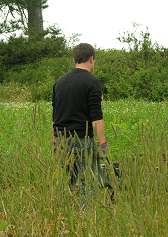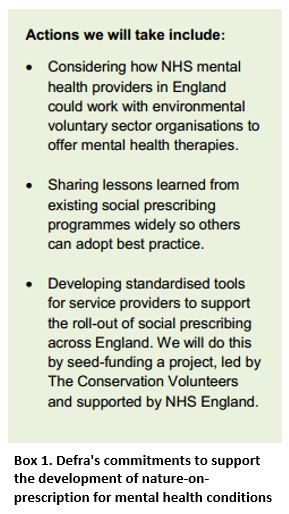We have successfully applied to the Medical Research Council’s (MRC) Public Health Intervention Development (PHIND) fund to develop a nature-on-prescription group intervention for people with common mental health conditions. The project will be led by Dr Ruth Garside and is a collaboration between the University of Exeter and University of Plymouth PenCLAHRC.
We are recruiting for a researcher to undertake this exciting work!

Primary care practitioners frequently see people who are distressed to the extent that it affects their ability to function. These people are at risk of a clinical diagnosis of stress, depression or anxiety. These mental health conditions are common. For example, over their lifetime, one in four UK women and one in ten men experience depression serious enough to require treatment. A range of treatments are recommended by national guidelines including: therapies, such as cognitive behaviour therapy; activities, such as exercising; and medication, such as antidepressants
Sometimes these treatments are not as effective as desired, the delivery methods or intervention activities are inappropriate, and some patients prefer, or avoid, particular treatments, such as medication. Because of this it is important to develop a range of treatment options that are suitable for differing needs and desires.
An alternative to the usual treatments options are nature-based group activities such as community gardening (one of the most popular leisure activities) and conservation work. There is tentative evidence that such nature based activities result in a range of positive outcomes and as a result a number of organisations, including MIND and the Conservation Volunteers, are working with GPs, nurses or mental health workers to offer them as a form of ‘social prescription’ or community referral.
There is significant interest in the potential of social prescribing to help address common mental health conditions. The Department of Health and Social Care recently provided funds to support innovation in social prescribing and Defra’s new 25 Year Plan for the Environment sets out how the department will support nature based nature-based social prescribing for mental health (Box 1).
There is, however, variation in the type and scope of nature-based activities provided through social prescribing, and in how frequently people attend, and for how long. It is unclear which activities are most likely to have a positive impact. A number of aspects of the interventions may have a positive impact. For example, group activities might mean people feel less isolated and pursue shared goals. Physical activity is also known to be beneficial for mental health. It is thought that spending time in nature can help, but we don’t know how or what sort of engagement helps.
Our new project will use a structured approach to design a programme of nature-based, group activities suitable for prescribing through primary care and other pathways. We will collect information from research literature, and work with three key groups of people: relevant NHS staff, people with common mental health conditions and their families, and those who organise nature-based activities. Using this information, we will analyse how, and why, different elements of a programme might help people with depression. We will also explore how it should be organised. Once this project is complete, we will be able to test the acceptability and effectiveness of nature-based, group treatment.

[…] are advertising for a 18 month full time Postdoctoral Research Fellow to assist with our new MRC funded Developing a Nature-on-Prescription Intervention project (4 day/wk). The successful candidate will also support systematic review work for the Blue […]
[…] environment based health interventions. Here we have several projects focusing on what works in the prescribing of environmental activities for people with mild to moderate mental health problems by primary care professionals. Although […]